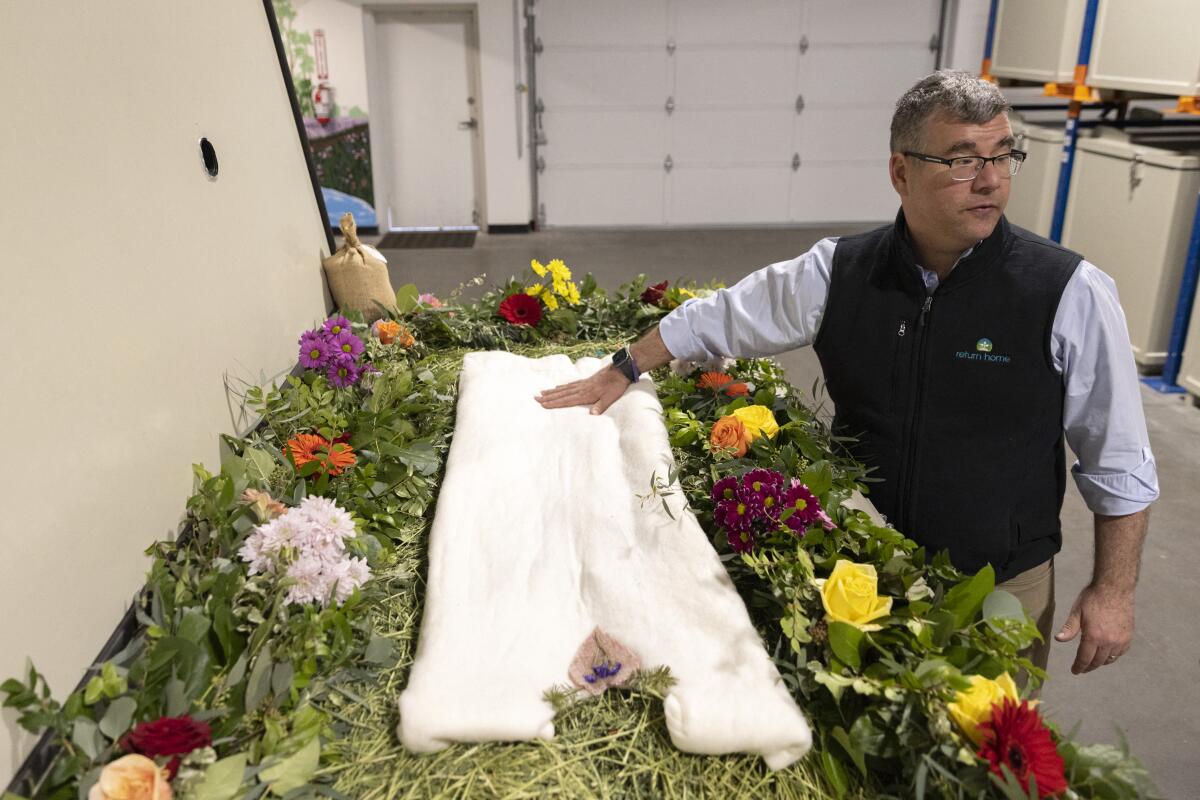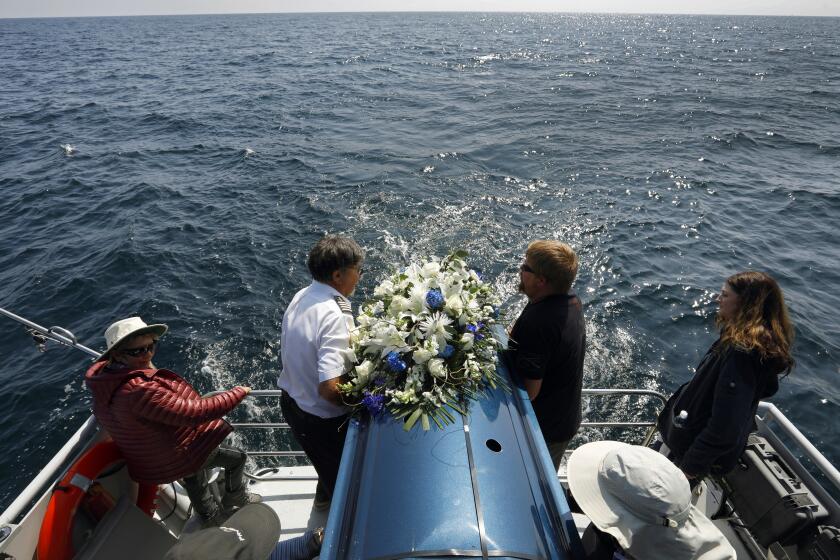Is California ready for ‘human composting’ as an alternative to casket burial, cremation?

- Share via
During a rafting trip in the West, Angela Bean took a palm full of her son’s ashes and spread them across rushing water. Her 27-year-old son, who died in a fatal fall from a pickup truck in 2015, had told her he wanted to donate his organs and be cremated.
Years later, Bean found out about human composting, an alternative burial method to cremation and conventional casket burials that had been legalized in Washington and other states.
“If California had that option back then, I know he would’ve liked to have been composted,” the Oakland resident said about her son, who studied natural resources at Cal Poly San Luis Obispo.
Now, it may soon be legal in California.
Assembly Member Cristina Garcia (D-Bell Gardens) this year introduced Assembly Bill 351, a bill that would make California the fifth state to legalize human composting. This is the third time California lawmakers are considering legalizing the alternative method, a proposal that has strong bipartisan support. Garcia said it is not entirely clear to her why the bill failed in 2020 and 2021, but she assumes it’s because the topic feels daunting.
But this year, she’s confident it will fare better.
Southern California boat captains say they have never been busier burying people at sea.
“Talking about what happens to our bodies when we die makes people feel uncomfortable or icky,” she said.
Human composting — or natural organic reduction — is an eco-friendly alternative burial option to the traditional casket burial or cremation methods. When composted, a body is placed in a steel vessel and buried in wood chips and other biodegradable materials that allow the body to naturally decompose over a 30-day period.
Once the body decomposes fully into soil, it is then returned to the family’s possession, similar to the practice of cremation. Natural organic reduction has gained in popularity mainly because it produces far fewer greenhouse gases than other burial methods and is less invasive of a process.
“I want to become a plum tree,” Garcia told The Times, saying if the law passes, she would choose to be composted.
Washington was the first state to legalize human composting in 2019, and Colorado, Oregon and Vermont soon followed. Massachusetts lawmakers are also considering legalizing the burial method, and are expected to vote on the measure this summer.
Garcia, as both a Catholic and Mexican American, celebrates the Day of the Dead and is a caretaker for her own family — a cultural practice that she says has left her curious about what options she wants to have during her own death planning.
- Share via
Watch L.A. Times Today at 7 p.m. on Spectrum News 1 on Channel 1 or live stream on the Spectrum News App. Palos Verdes Peninsula and Orange County viewers can watch on Cox Systems on channel 99.
The Catholic Church has been an outspoken opponent of the bill, arguing that it is an undignified practice. The California Catholic Conference, listed as the only opponent to AB 351, did not respond to a request for comment from The Times.
Garcia said while she respects the religious sentiment that opposes human composting as an option, she does not want to let religious doctrine control what people can do with their bodies once they die.
Supporters of the legislation say it will introduce an eco-friendly option in an otherwise polluting industry.
Residents are hoping the bill passes as they confront their own mortality, such as a Sacramento woman with Stage 4 cancer who asked to not give her name to protect her medical privacy.
“When I saw the bill was passed in Washington, it was like, ‘eureka!’ This is it for me,” she said.
Transporting her body out of state once she dies would be an added cost and burden on her family, she said. By legalizing composting in California, she and many other residents would have more affordable and local access.
Recompose, a Seattle-based company and the first funeral home to build a human composting facility in the country, places the body into a steel vessel — each 8 feet long and 4 feet tall — that is then filled with wood chips, alfalfa and straw. Microbes enable bodies to decompose into one cubic yard of nutrient-rich soil within about a month.
The service, which costs about $7,000, is slightly more affordable than a casket funeral and more costly than cremation.
“We’ll never be the least expensive funeral option,” said Katrina Spade, the company’s chief director.
Spade said that the price accounts for the time it takes to tend to one body. Recompose, however, keeps a reserve community fund for those who can’t afford the whole price.
Cremation is already outpacing burials in the United States. In California, by 2040, only about 13.5% of those who die will be buried — one of the lowest projections of all U.S. states, according to the National Funeral Directors Assn.
In California, cremations are expected to jump to 80% that same year — and environmental advocates argue that cremation, which produces nearly 6.8 million metric tons of carbon dioxide each year, poses its own environmental toll on the planet as do casket burials and embalming chemicals.
Spade was inspired by the decades-long agricultural practice that decomposes dead livestock into soil. According to Recompose, each body that is composted can prevent one metric ton of carbon dioxide from entering the atmosphere.
“This is a question of consumer choice, and Californians should have access to a death care option that is natural, carbon-neutral, and a sustainable alternative to cremation or burial,” said Haley Morris, a spokesperson for Earth Funeral, another human composting facility based in Auburn, Wash. “We believe soil transformation empowers people to fully live out their values of sustainability and repair the Earth for future generations. We’re grateful for ... Garcia’s leadership on this issue.”
Human composting is not the first time death care has been re-imagined. California has already sanctioned alkaline hydrolysis — cremation by water — when then-Assemblyman Todd Gloria (D-San Diego) authored AB 967 in 2017. Similarly, green burials, a natural burial method that usually buries a body in a shroud, make up only a small percentage of the country’s burials, according to the most recently available statistics published by the Green Burial Council, which estimated about 1 in 20 — or 5% — of burials were green in 2019.
While a traditional burial emits about 250 pounds of carbon, a green burial can actually sequester 25 pounds, assuming that a green burial site would require no mowing, watering or fertilization, according to the Green Burial Council.
“Whether it’s green burial, natural organic reduction or water cremation, people are interested in options that are more ecologically friendly,” said Caitlyn Hauke, the president of Green Burial Council International.
Los Angeles resident Donald LaFrance said he knows his burial preference for certain. He would rather choose to be composted than buried through green burial because “you’re still taking up a plot of land.”
“Why,” he said, “am I going to have what’s little left of my body take up a place on this Earth?”
More to Read
Sign up for Essential California
The most important California stories and recommendations in your inbox every morning.
You may occasionally receive promotional content from the Los Angeles Times.













